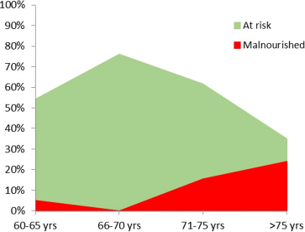Abstract
Nutrition is the single most important determinant of the health of an individual and provides essential support during the ageing process. Malnutrition is not a consequence of ageing and should never be considered as a normal process. Early detection of nutritional problems is vital to ensure the quality of life throughout these extended years. This study aimed, at assessing the nutritional status among the elderly (60 years and above), in the rural field practice area of SRM Medical College Hospital and Research Centre (Kalivanthapattu village), and to identify the correlates of malnutrition. A Community-based Cross-sectional study was conducted for assessing the Nutritional status of the elderly population (≥ 60 years) in Kalivanthapattu village using MNA (Mini Nutritional Assessment) scale. Data analysed using SPSS 22. Descriptive data were presented in percentages, mean, standard deviation. Chi-square test was used to prove the association between categorical variables. p-value < 0.05 is considered statistically significant. Among 102 participants, 33% are with normal nutritional status, 59% were at risk, and 8% of individuals were malnourished. Both males and females were >50% at risk of malnutrition. The association of age, spouse status, whether alive or dead and the type of house were found to be statistically significant (p <0.05). This study stresses on the nutritional assessment of elderly followed by anthropometric, clinical, biochemical and functional assessments in malnourished individuals and those at risk of malnutrition. Like immunisation schedule for under-five children, it is essential to rope Malnutrition scale to assess the nutritional status at or over the age of 60 years.
Full text article
Authors

This work is licensed under a Creative Commons Attribution-NonCommercial-NoDerivatives 4.0 International License.

